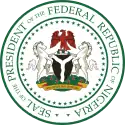President of Nigeria
The President of Nigeria is the head of state and head of the executive of Nigeria. The first President of Nigeria was Nnamdi Azikiwe.[2] The current President is Bola Tinubu, since 29 May 2023.[3]
| President of Nigeria | |
|---|---|
 Seal of the President | |
| Style | Mr. President (Informal)[1] (Formal) His Excellency (diplomatic, outside the U.S.) |
| Residence | Aso Villa Abuja |
| Term length | Four years renewable once |
| Inaugural holder | Nnamdi Azikiwe 1 October 1963 |
| Formation | 1 October 1963 |
| Salary | ₦3,514,705 ($17,657) annually |
| Website | The State House Abuja |
Requirements
The 1999 Constitution of Nigeria of Nigeria sets the requirement. A president must:
- be a citizen of Nigeria;
- be at least 40 years old;
- be a member of a political party and is sponsored by that political party.
Powers of the president
These powers include:
- Appointing ambassadors and diplomatic and consular representatives
- Approving and signing of bills
- Conferring honours
- Receiving and recognising foreign diplomatic and consular representatives
- Referring a Bill to the Constitutional Court for a decision on the Bill's constitutionality
- Summoning the National Assembly, or Parliament to an extraordinary sitting to conduct special business
References
- "How To Address The President; He Is Not Your Excellency Or Your Honor, But Mr. President". The New York Times. 2 August 1891.
- Professor Henry Louis Gates, Jr.; Professor Emmanuel Akyeampong; Mr. Steven J. Niven (2 February 2012). Dictionary of African Biography. OUP USA. pp. 314–. ISBN 978-0-19-538207-5.
- Smith, David (29 May 2015). "Historic succession complete as Buhari is sworn in as the president of Nigeria" – via www.theguardian.com.
Other websites
Wikimedia Commons has media related to Presidents of Nigeria.
This article is issued from Wikipedia. The text is licensed under Creative Commons - Attribution - Sharealike. Additional terms may apply for the media files.
_(Cropped).png.webp)